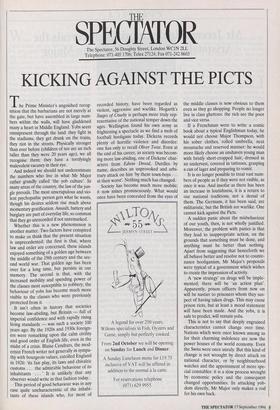SPEdfATOR
The Spectator, 56 Doughty Street, London WC1N 2LL Telephone: 071-405 1706; Telex 27124; Fax 071-242 0603
KICKING AGAINST THE PICTS
The Prime Minister's anguished recog- nition that the barbarians are not merely at the gate, but have assembled in large num- bers within the walls, will have gladdened many a heart in Middle England. Yobs seem omnipresent through the land: they fight in the stadiums, they get drunk on the trains, they riot in the streets. Physically stronger than ever before (children of ten are an inch taller than they were 20 years ago), we all recognise them: they have a terrifyingly malevolent vacancy in their eye.
And indeed we should not underestimate the numbers who live in what Mr Major rather grandly called 'the yob culture'. In many areas of the country, the law of the jun- gle prevails. The most unscrupulous and vio- lent psychopathic person gets what he wants, though his desires seldom rise much above momentary gratification. Assault, battery and burglary are part of everyday life, so common that they go unrecorded if not unremarked. Whether this is a new phenomenon is another matter. Two factors have conspired to make us think that the present situation is unprecedented: the first is that, where law and order are concerned, these islands enjoyed something of a golden age between the middle of the 19th century and the sec- ond world war. That golden age has been over for a long time, but persists in our memory. The second is that, with the increased mobility and spending power of the classes most susceptible to yobbery, the behaviour of yobs has become much more visible to the classes who were previously protected from it. It isn't often in history that societies become law-abiding, but Britain — full of imperial confidence and with rapidly rising living standards — was such a society 100 years ago. By the 1920s and 1930s foreign- ers were remarking upon the calm civility and good order of English life, even in the midst of a crisis. Blaise Cendrars, the mod- ernist French writer not generally in sympa- thy with bourgeois values, extolled England in 1926: its fair play, its laws and chivalric customs . . . the admirable behaviour of its inhabitants . . . ' It is unlikely that any observer would write in that fashion today.
This period of good behaviour was in any case quite uncharacteristic of the inhabi- tants of these islands who, for most of
recorded history, have been regarded as violent, aggressive and warlike. Hogarth's Stages of Cruelty is perhaps more truly rep- resentative of the national temper down the ages. Wellington found his own army as frightening a spectacle as we find a mob of football hooligans today. Dickens records plenty of horrific violence and disorder: one has only to recall Oliver Twist. Even at the end of his career, as society was becom- ing more law-abiding, one of Dickens' char- acters from Edwin Drood, Durdles by name, describes an unprovoked and arbi- trary attack on him 'by them town-boys . . . at their worst'. Nothing much has changed.
Society has become much more mobile; it now mixes promiscuously. What would once have been concealed from the eyes of the middle classes is now obvious to them even as they go shopping. People no longer live in class ghettoes: the rich see the poor and vice versa.
If a Frenchman were to write a comic book about a typical Englishman today, he would not choose Major Thompson, with his sober clothes, rolled umbrella, neat moustache and reserved manner: he would more likely choose an unshaven young man with bristly short-cropped hair, dressed in an undervest, covered in tattooes, grasping a can of lager and preparing to vomit.
It is no longer possible to treat vast num- bers of people as if they were not visible, as once it was. And insofar as there has been an increase in loutishness, it is a return to our national traditions, not a denial of them. The Germans, it has been said, are militaristic, but the British are warlike. One cannot kick against the Picts.
A sudden panic about the misbehaviour of our youth, then, is not wholly justified. Moreover, the problem with panics is that they lead to inappropriate action, on the grounds that something must be done, and anything must be better than nothing. Apart from suggesting that henceforth we all behave better and resolve not to counte- nance hooliganism, Mr Major's proposals were typical of a government which wishes to create the impression of activity.
A 'new strategy' on drugs will be imple- mented; there will be 'an action plan'. Apparently, prison officers from now on will be nastier to prisoners whom they sus- pect of having taken drugs. This may cause prison riots, but at least a mood statement will have been made. And the yobs, it is safe to predict, will remain yobs.
This is not to say that deeply engrained characteristics cannot change over time. Nations which were once known among us for their charming indolence are now the power houses of the world economy. Even the Swiss were once unruly. But this kind of change is not wrought by direct attack on national character, or by neighbourhood watches and the appointment of more spe- cial constables: it is a slow process wrought by economic policy and the consequent changed opportunities. In attacking yob- dom directly, Mr Major only makes a rod for his own back.


























































 Previous page
Previous page